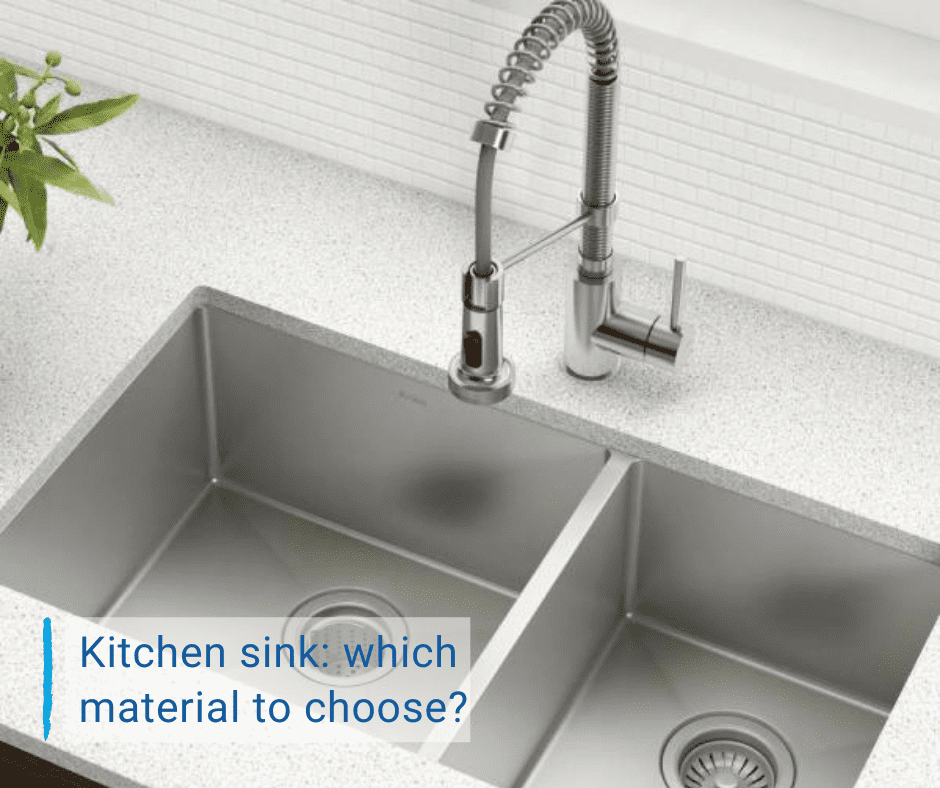When it comes to fitting a kitchen, choosing the right sink is an important matter. It will play an essential role in the overall convenience as well as aesthetic. Even though a stainless steel sink is the most commonly pick, a wider choice of materials exists. You will then need to choose according to your needs in term of budget, convenience, and aesthetic. Here are the different advantages and disadvantages of the kitchen sinks of different materials.
Stainless steel kitchen sink
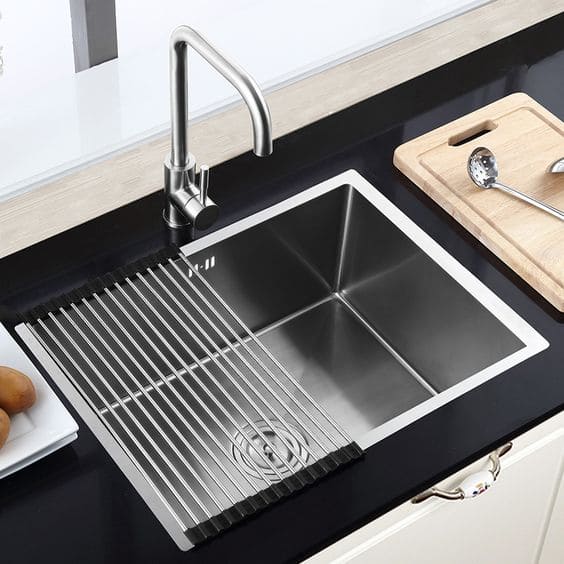
Advantage
A must in most kitchens, it is famous for its hygiene and antibacterial quality. Stainless steel is the most effortless material to clean and is resistant to impacts, corrosion, heat, and thermal shocks. Moreover, as it is lite, its installation proceeds smoothly. No need of calling the help of a professional. Also, stainless steel offers a broad range of prices that suits any budget, from £50 to £5,000.
Disadvantage
Although the cleaning is easy, limescale is the pet peeves of stainless steel sinks. You will need to be thorough and clean in daily if you want to keep its shine. Also, water stains and fingerprints easily build-up on the surface. When it comes to scratches unless you apply a special coating, it is not scratch resistant.
Ceramic sink
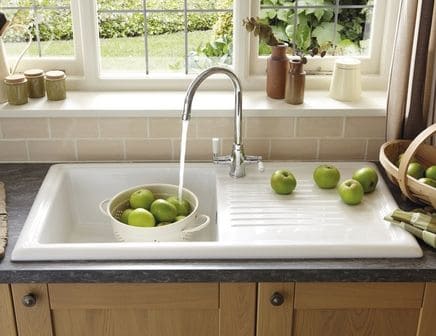
Advantage
Heavily used in bathrooms, the ceramic sink is a good alternative to the stainless steel sink in the kitchen as it is equally easy to clean. However, it does not share the same disadvantages. Ceramic is scratch-resistant and does not let water stain and fingerprint build-up. The installation is also simple, and a lot of different products are available from £50 to £1,000.
Disadvantage
Unfortunately, although ceramic is strong, a too violent impact could crack or break the sink. It is neither resistant to strong heat and thermal shocks. When it comes to aesthetic, the ceramics offers only a limited range of choice in shapes and colours.
Stone kitchen sink
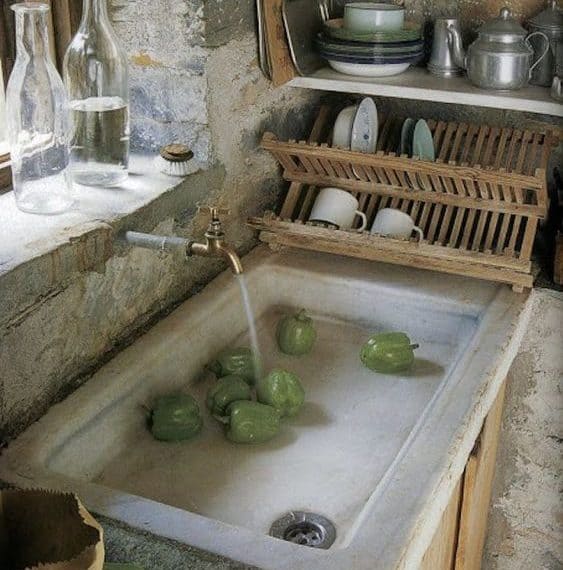
Advantage
Stone is a natural, elegant, and timeless material that offers plenty of possibilities for the kitchen’s design with the different colours and shapes that it offers. The stone is also solid, resistant to impacts, scratches and high temperature.
Disadvantage
The main disadvantages of stone are its weight and price. It is one of the most onerous materials a sink could feature. The price goes from £400 to £4,000. When it comes to weight, it weighs from 25kg to 35kg. You will then have to ensure that the surface on which the stone will stand is resistant enough. Also, you will need the help of a professional to install it. Furthermore, to protect the stone from limescale, it needs a waterproof coating. Strong detergents aren’t its friend either. Lastly, keep in mind that the stone’s colour changes when it gets wet.
Resin Sink
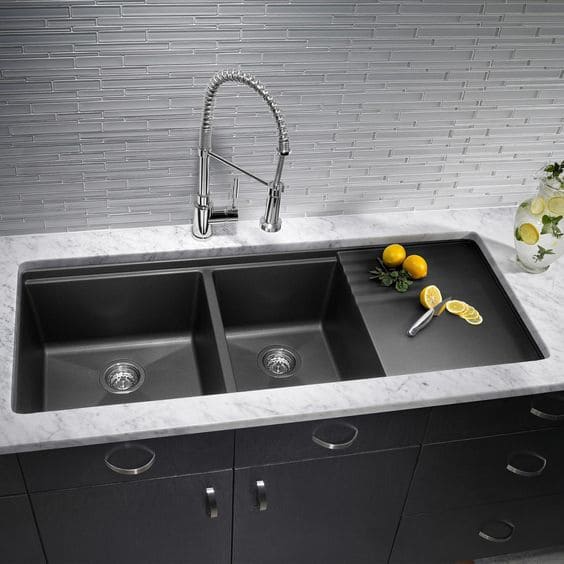
Advantage
Very modern, the use of resin for kitchen sink spreads more and more. It can be cast in limitless variants of shapes and colours. Different textures can also be added to widen the personalisation. The material is also inexpensive, prices fluctuate between £50 and £200. Also, it resists to impacts and thermal shocks. Its installation and maintenance are simple, and the biggest advantage of a resin sink is that it can be repaired.
Disadvantage
All of the resin sinks aren’t equal in term of hardness. As resin is a synthesis of different materials and its solidity will depend on what was added. Hence, a sink composed of resin and fibreglass won’t offer the same quality as one made of resin and granite. Also, depending on the synthesis, yellowing and flaking can appear with time.
Sink in waxed-concrete
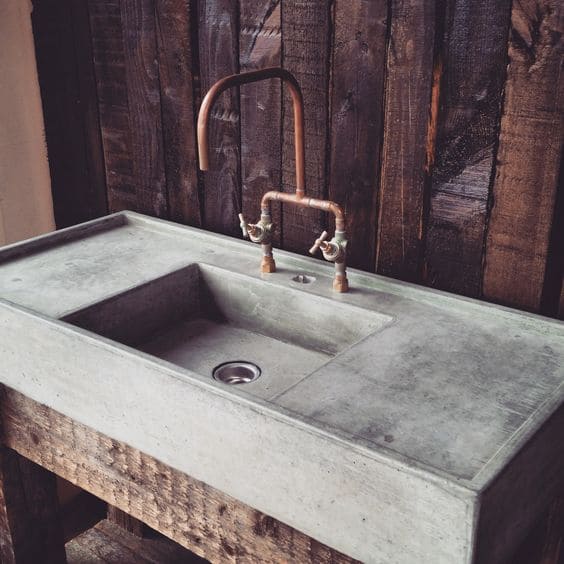
Advantages
Beyond being an eye-catcher with its elegant and rough style, waxed-concrete also features huge durability. Its ruggedness makes it resistant to impacts, heat, and thermal shocks. The cleaning is also easy.
Disadvantages
The biggest drawback of waxed-concrete is its price. You will need to spend at least £600 to get the low-ends. Moreover, its installation necessitates the help of a professional. Also, it dreads water and grease stains. You will then need to apply a waterproof coating. Lastly, even if scratches are rare, they are nevertheless not impossible.
Tempered glass
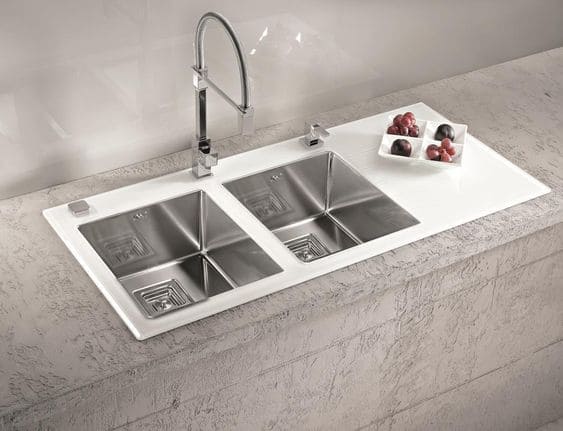
Advantages
It is an original and trendy material that brings elegance and luxury to any kitchen. Moreover, unlike what you might think, it is easy to clean, resistant to impacts, thermal shocks, and fingerprints.
Disadvantages
Tempered glass is the last material to consider for a kitchen sink. As it is not common, it cannot be found everywhere. It is also the most expensive, with an average price between £1,000 and £2,000. Bear in mind that for the price paid, the resistance offered does not stand out from any of the materials previously described.
Do not hesitate to leave a comment if you have any specific question on areas you need clarification.

